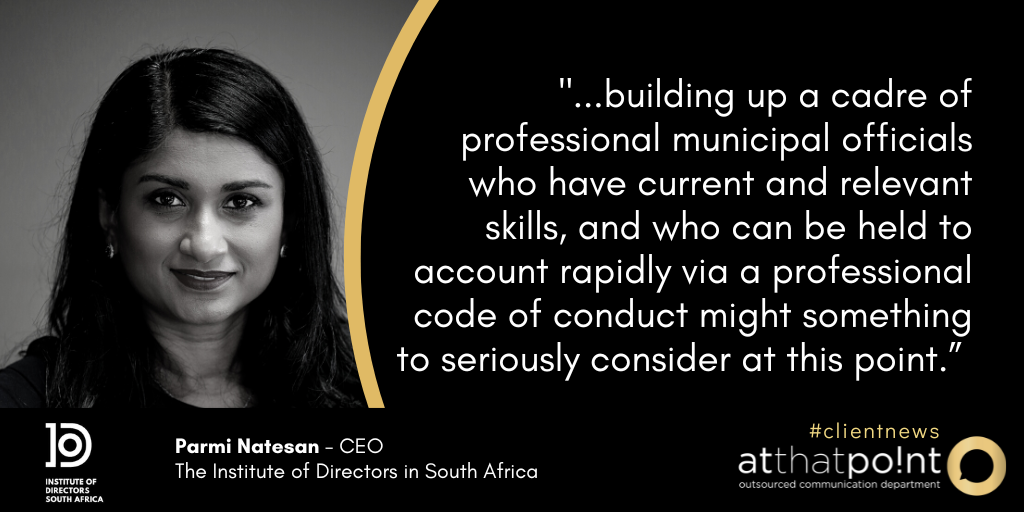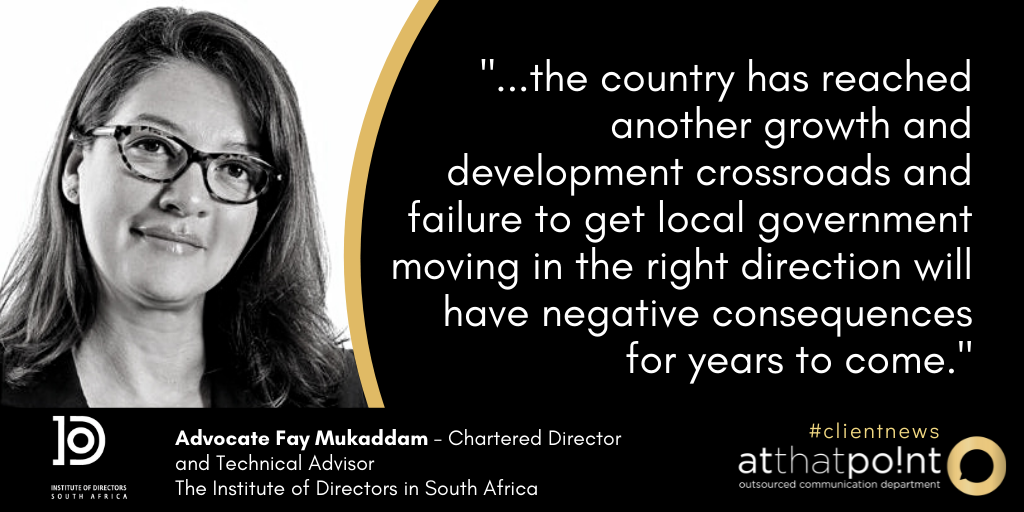Auditor General’s local government report: local government should be professionalised, says IoDSA21/6/2022  The recent report on local government by the Auditor General, Tsakani Maluleke, is a timely reminder of the prevailing dysfunction in municipalities across the country, and the catastrophic impact that is having on all South Africans. The Auditor General is right to lay the blame squarely on the shoulders of municipal leaders, says Parmi Natesan, CEO, Institute of Directors in South Africa (IoDSA)—but perhaps we also need to be talking about professionalising municipal management as well. “There’s a reason that King IV’s first principle concerns leadership because ultimately everything stems from what goes on at the board or council. Principle 1 speaks to the absolute need for ethical leadership, while Principle 10 deals with the imperative to delegate the council’s authority to a competent municipal manager on whom it can rely,” she argues. “King IV’s sector report on municipalities further recommends that councils ensure they have access to ‘professional and independent guidance on corporate governance and its legal duties’ (King IV, p 85).” The theme of the Auditor General’s Consolidated General Report is “Capable leaders should demonstrate change by strengthening transparency and accountability”. The corollary is that we have now to ask whether municipal councils and audit committees have the right leadership of ethical and effective leaders. What criteria are used to appoint municipal councillors and do we know precisely what competencies they need to have in order to discharge their duties properly? she asks, noting that, as the Auditor General pointed out in her report, senior municipal management has been dilatory at best in implementing the detailed recommendations contained in previous reports. Ms Natesan concurs, saying that this state of affairs seems to be the result of decades of incompetence and even criminal behaviour. “However, as noted, the buck stops with the municipal council. Councils are gravely at fault because they do not hold senior management to account for how they fulfil their duties, and they should, in turn, be held accountable,” she says. Constitutionally, the national and provincial governments are bound to assist in strengthening and supporting municipalities to operate effectively (Constitution of the Republic of South Africa, 1996, s154(1)). Section 139 sets out how, in extreme cases, provincial governments can intervene in local government. But, says, Ms Natesan: “Given that these interventions do not necessarily seem to solve the problem, not least because everything is so politicised, are we now not overdue in simply professionalising local government? Municipalities are where most of the really important service delivery actually occurs—or doesn’t occur. As we seem to be entering a period of unstable municipal coalitions that could make the council’s leadership role even less effective, building up a cadre of professional municipal officials who have current and relevant skills, and who can be held to account rapidly via a professional code of conduct might something to seriously consider at this point.” ENDS MEDIA CONTACT: Stephné du Toit, [email protected], 084 587 9933, www.atthatpoint.co.za For more information on the IoDSA please visit: Website: www.iodsa.co.za Twitter: @The_IoDSA LinkedIn: Institute of Directors in South Africa Company Page Facebook: Institute of Directors South Africa
0 Comments
 THE upcoming local government elections are unquestionably one of the most important in South Africa’s recent democratic history and the Institute of Directors South Africa (IoDSA) joins a widespread call to urge voters to turn out in their numbers. The Institute’s CEO Parmi Natesan says, “There is sufficient evidence to suggest that many municipalities in South Africa are either failing or close to a state of complete collapse. Poor service delivery has a direct impact on jobs and sustained growth and its only through the ballot box that people can make their dissatisfaction heard and to effect change where necessary.” From a governance perspective, the voters are, after all, key stakeholders in these entities and thus need to hold the leadership to account. According to the office of the Auditor General, less than 40 of the country’s 278 municipalities are said to be on a sound financial footing and should this trendline continue the risk to investment will continue unabated as well as putting increasing strain on the national fiscus as well as South Africa’s sovereign risk. Fay Mukaddam, a governance specialist with the IoDSA notes, “There is no doubt that the country has reached another growth and development crossroads and failure to get local government moving in the right direction will have negative consequences for years to come. And it’s at this level where the crisis is most pronounced. If a municipality is unable to effectively offer the most basic of services, there is an immediate negative sentiment created and this has rapid knock-on effect on the creation of new jobs.” A case in point says the IoDSA was the recent case of dairy company Clover’s decision to relocate its cheese factory from the town of Lichtenburg in the Ditsobotla Municipality due to poor service delivery for number of years. Over 400 – permanent and temporary - jobs were lost which could have been saved had there been more attention focussed on basic issues like garbage disposal and road maintenance. The Institute says for business to remain focussed and competitive; it must have a constant symbiotic and trusting relationship with local government and part of the compact is making sure a sustainable operating environment is delivered all year round. Mukaddam says while the Clover example was a high-profile and well documented issue, there are many other businesses in South Africa that are experiencing similar frustrations and that the November 1 election can be a time for businesses to send a clear and unambiguous message to failing municipalities that they have run out of runway. The IoDSA says it also acknowledges that poor service delivery and inefficient municipalities cannot be an overnight fix and that current problems are in many cases historical. Part of the dilemma according to the Bureau for Economic Research at Stellenbosch University lies with mangers and staff who often lack technical insight; and in the way that tender specifications are drawn up. An additional problem is that many smaller and poorer municipalities do not have a proper tax base. Natesan concludes, “We acknowledge these are deep-rooted problems which result daily in poor management of operational budgets; a failure in many cases to spend capital budgets as well as wasteful and irregular expenditure. And while change might occur at the political level, that doesn’t mean that problems like this will disappear immediately. There is also a vital need for functional and effective change at the governance and administrative level but that the November 1 poll is the starting point.” ENDS MEDIA CONTACT: Idéle Prinsloo, 082 573 9219, [email protected], www.atthatpoint.co.za For more information on the IoDSA please visit: Website: www.iodsa.co.za Twitter: @The_IoDSA LinkedIn: Institute of Directors in South Africa Company Page |
Archives
July 2024
Categories
All
|

 RSS Feed
RSS Feed